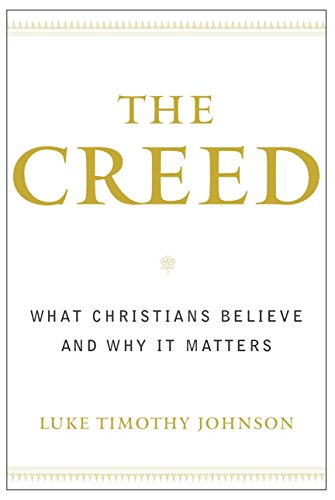This week we will be discussing the first article of the Nicene Creed. Please read Chapter 3 “We Believe in One God” in The Creed: What Christians Believe and Why It Matters. Within this chapter, Johnson teases out the depths of this “exceptionally compressed” confession as to the first person of the Trinity. As you read through this section (and the remaining sections of the book) please keep a Bible close by. Johnson repeatedly takes us back into the Scriptures in his discussion.
The uniqueness of our faith as set forth in the Creed lies in our most basic fundamental confession that God is one essence (ousia) in three persons (hypostases). Personhood forms the foundation of who we profess God is. In Greek, the word “person” necessarily implies a relationship. I have attached the first chapter of Person and Eros by Christos Yannaras, a contemporary post-modern Greek Orthodox philosopher, where the definition and significance of the word “person” are exhaustively discussed. In Greek “person” (pros-opon) is a compound word meaning “towards (pros) the face/eyes (ops).” In other words, a person is something facing someone or something else. To be a person, therefore, is to be relational, and by extension, the fundamental nature of existence is defined as being in relation to something else. In section 4, Yannaras discusses how this conception of “person” gives rise to the Creed itself.
At the end of the chapter in section 7, Yannaras has a brief discourse on how we study God. From the perspective of the Creed, any discussion of God does not begin with the essence of God or the attributes of the Divine. Rather, any discussion of God must begin with personal/relational disclosure of God – the God of Abraham, Isaac, and Jacob and the God of the Father, Son, and Holy Spirit. As we looked at last week, the essence of God is beyond all intellectual conception, and therefore God as an Object of study is impossible. But if we begin with God as Persons with whom we can relate through our own existential, ecstatic, eros (as he defines these terms in section 6) experience of God, then we can move forward.
Yannaras is very dense and difficult to get through. But if you do manage to read through this selection, he does provide with us an understanding of the importance of meeting God through the Personhoods of God.
Dinner is at 6. The menu is gumbo. Discussion about 6:45. Hope to see you here.
He who made the Pleiades and Orion,
Amos 5:8
and turns deep darkness into the morning,
and darkens the day into night,
who calls for the waters of the sea,
and pours them out upon the surface of the earth,
theLordis his name,

